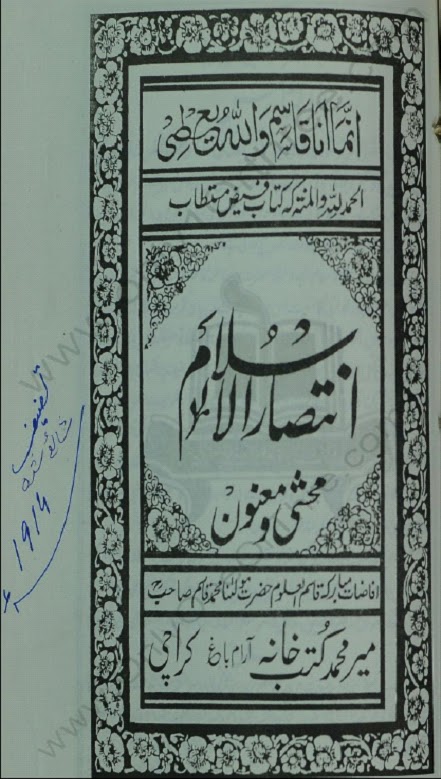The
deviant shaikh Muhammad Mahmud Taha who claimed that all of the
Medinese verses of the Holy Quran are no longer applicable, was
executed by the Sudanese government for in 1985. He founded a new
sect called the Republican
Brothers (Hizb
al-Jamhuri). They have publicised a book on their website entitled
The
Return of Christ.
Regarding the verse of the Quran
ہَلۡ
یَنۡظُرُوۡنَ اِلَّاۤ اَنۡ یَّاۡتِیَہُمُ
اللّٰہُ فِیۡ ظُلَلٍ مِّنَ الۡغَمَامِ
وَ الۡمَلٰٓئِکَۃُ وَ قُضِیَ الۡاَمۡرُ
ؕ وَ اِلَی اللّٰہِ تُرۡجَعُ الۡاُمُوۡرُ
Translation:
Are they
looking for nothing (to accept the truth) but that Allah (Himself)
comes upon them in canopies of cloud with angels, and the matter is
closed. To Allah shall all matters be returned. [2:210]
In
respect to this blessed Ayah of the Quran, the Republican
sect
(followers of Mahmud Taha) write:
Of
the coming of the final Messiah, and his personification of the
qualities of the Lord at the peak described by Mohamed, “Adopt the
qualities of Allah, my Lord is on the straight path,” the Koran
says, “Are they not only expecting when Allah comes to them in
shadows of clouds, accompanied by the angels when all is done, and to
Allah returns all things.”
So
we see how the Republican sect has interpreted the above cited verse
about Allah coming in the shadow of clouds and Angels as a reference
to the coming of the Messiah Jesus (peace be upon him)!
In
fact, the Republican followers of Mahmud Taha have inherited this
belief and understanding of the verse [2:210] from an extinct sect of
Mu'tazilites known as the Khabitiyya. The Habitiyya (also
known as Khabitiyya)
is a sect attributed to Ahmad b. Habit. Regarding his and his sect's
belief, Imam Ibn Abdul Karim al-Shahrastani (d.548 H) explains:
إثبات
حكم من أحكام الإِلهية في المسيح عليه
السلام موافقة للنصارى على اعتقادهم أن
المسيح عليه السلام هو الذي يحاسب الخلق
في الآخرة وهو المراد بقوله تعالى:
وجاء
ربك والملك صفاً صفاً (الفجر:
22 )هو
الذي يأتي في ظلل من الغمام وهو المعنى
بقوله تعالى:
ويأتي
ربك(
العنام:158)
وهو
المراد بقول النبي عليه السلام:
إن
الله تعالى خلق آدم على صورة الرحمن.
وقوله:
يضع
الجبار قدمه في النار.
وزعم
أحمد بن خابط أن المسيح تدرع بالجسد
الجسماني وهو الكلمة القديمة المتجسدة
كما قالت النصارى
Translation:
“They assign to the Messiah one of the divine prerogatives,
agreeing with the Christians in their belief that he is the one who
will call mankind to a reckoning in the next life. He is the one
meant by Allah's Words “Your Lord comes with Angels in their ranks”
[89:22]. He (Messiah) is also the one who will come in shadowing
clouds, and who is referred to by the words of Allah: “Until Your
Lord comes” [6:158]. Again, he is the one of whom the Prophet peace
be upon him spoke when he said: “Allah created Adam in the Image of
Al-Rahman”, also when he said: “Al-Jabbar will put His Foot in
the Fire”. Ahmad b. Khabit maintained that the Messiah put on a
body of flesh, that is, [Shahrastani comments], the eternal Word
became incarnate, as the Christians say.”
Reference:
Al-Milal wan-Nihal; p.54







































